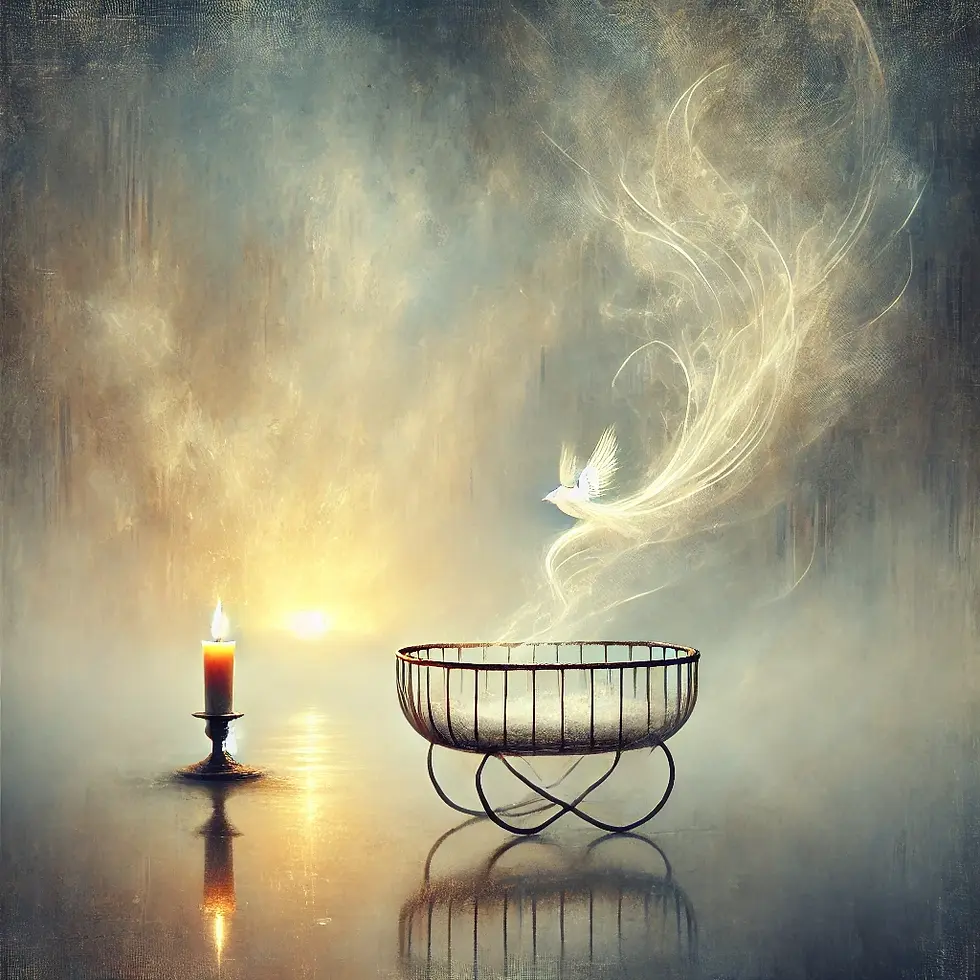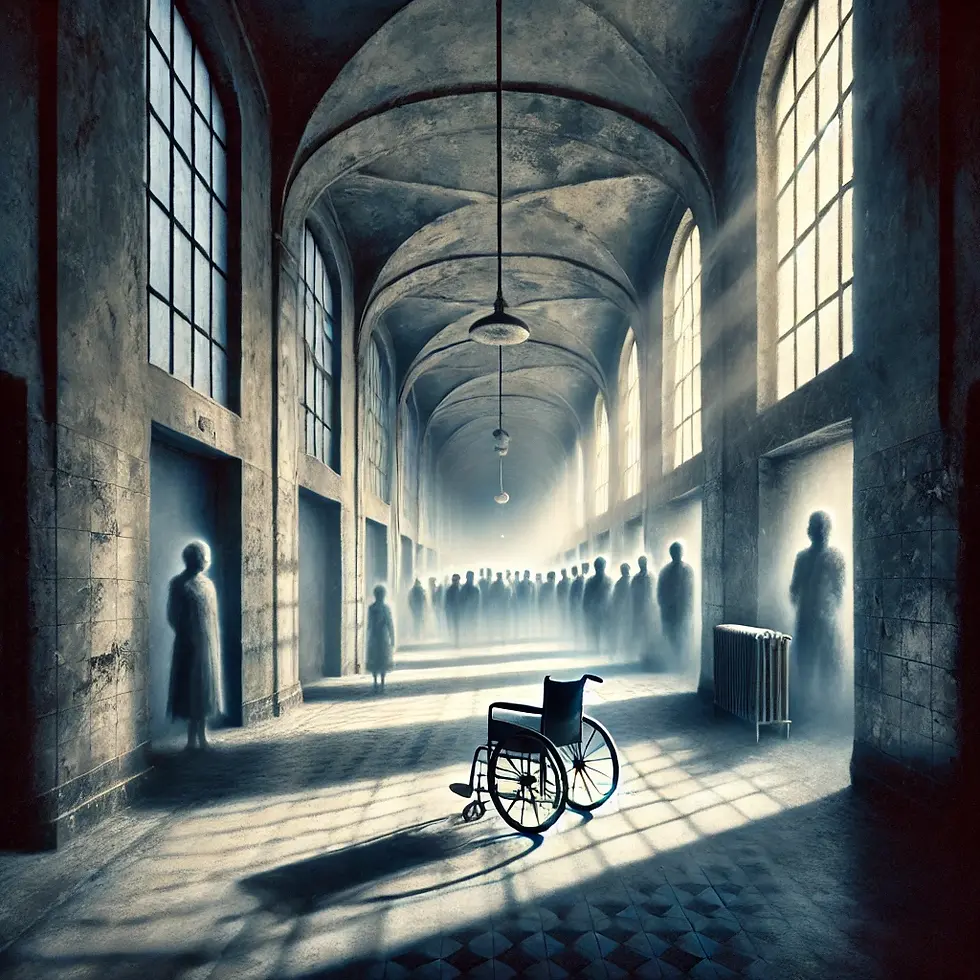
The Unborn and the Condemned: A Conversation in the Flames
- A HumanKind

- Mar 15
- 4 min read
They carried life in a world built for death—only to watch it be taken before it could begin. Remember them. Remember the ones who never had the chance.
History tells us what happened. Dates, numbers, statistics. But it rarely lets us listen.
Today, I want to take you back—not just to facts, but to voices. I could tell you what women endured in the camps, how pregnancy was a death sentence, how newborns were not meant to survive. But instead, I will let them tell you themselves.
Let’s go back in time.
Let’s invite them to our fire.
Let’s sit with them, listen, and bear witness to what the world tried to erase.
Their names are real. Their words come from testimony. Their suffering cannot be rewritten.
And tonight, for a moment, they speak again.
Anka speaks first.
She sits with her knees drawn to her chest, hollowed by hunger.
Her baby kicks inside her—a life she never expected to carry this far.
“I was transported here in cattle cars. I held onto my husband’s hand as long as I could. They took him one way, me another. I was still carrying our first child then. It did not survive the journey.”
She looks at the others.
“There was no room to sit. No air to breathe. No food. No water. They let us out at Auschwitz, and I felt my baby slip away inside me.”
A pause. The fire crackles.
“I did not even bleed. My body was too empty for that.”
No one asks how she kept going. No one asks if she ever wanted to.
They already know the answer.
Vera shifts in the dirt. She barely speaks above a whisper.
“I didn’t know I was pregnant when I arrived. Maybe I would have chosen differently if I had.”
The others know what she means.
They know what happens to women who arrive pregnant.
“Mengele wanted to study us. He wanted to see how long we could carry before our bodies gave in. I did not want my child to be born in his hands.”
Her voice cracks, but she does not cry.
“So I bound my stomach. I kept my secret. Until the night I could not.”
No one asks what she did.
They do not ask what choice she had.
Angela rests her chin on her knees, staring into the fire.
“I was born here.”
The others turn to her, this child among them.
“My mother starved, but she made sure I did not. She shared her rations, piece by piece, until her ribs carved shadows on her skin.”
A slow inhale. A long exhale.
“Then one day, they took me from her. Mengele wanted to see if babies born in Auschwitz could live.”
A bitter laugh.
“They cannot.”
Stanisława, the midwife, folds her hands in her lap.
She has delivered thousands of babies in this place.
She does not smile when she speaks.
“I told them not to cry.”
They look at her.
“The mothers. The babies. The ones who lived for an hour, a day, a week. I told them to hush, to be silent. To not draw attention.”
Her fingers press into her palms.
“A baby that cries is a baby that dies.”
She does not say how many she has lost.
She does not say how many mothers she held in the aftermath.
She only watches the flames.
“And yet, they still gave birth. In the filth. In the cold. In the shadows. Because even here, life fought to exist.”
The fire grows dim.
The wind howls through the wires, through the silence, through the spaces where babies should have cried.
The women do not speak of what will come next.
They do not speak of the selections.
Of the cold.
Of the endless hunger.
But they know.
They know that not all of them will be here tomorrow.
That some will vanish into smoke.
That others will stumble and not rise.
But for this moment, they are here.
Their stories flicker like flames, burning bright, before the world tries to extinguish them.
And when the fire is gone, what will remain?
Only memory. Only names. Only the echoes of what could have been.
We Remember
🫀 Anka Bergman (1917–2013) – Survived the Holocaust and gave birth to Eva Clarke in Mauthausen concentration camp, weighing just 70 pounds. She lived to see her daughter grow up.
🫀 Vera Bein (1921–2018) – Conceived her child in Auschwitz, survived Mengele’s experiments, and later testified about the horrors she endured.
🫀 Angela Orosz-Richt (b. 1944) – One of the few infants to survive Auschwitz. She became a lifelong witness, sharing her story so others would not forget.
🫀 Stanisława Leszczyńska (1896–1974) – A Polish midwife who delivered over 3,000 babies in Auschwitz, defying SS orders. She refused to kill a single child, despite knowing their fate.
They lived. They bore witness. They held the weight of the unborn and the condemned.
And we must never let the flames consume their stories.
Sources:
Anka Bergman:
Vera Polgar (née Bein):
Angela Orosz-Richt:
Stanisława Leszczyńska:



留言